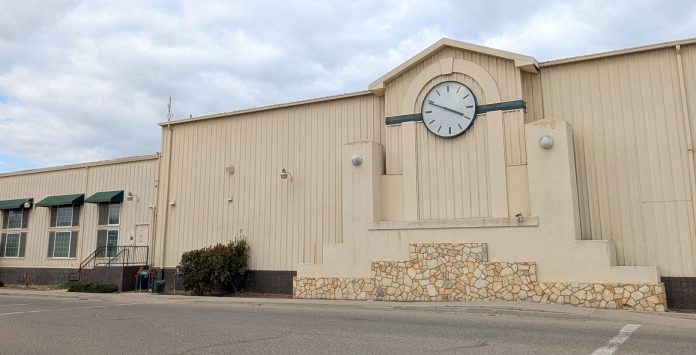
KING CITY — On King City’s First Street, so-named because it was, stands a metal building with a clock. This is the Meyers Farmworker Housing Facility, a dorm-style seasonal home for more than 350 agricultural workers from Latin America.
Since David Gill, Steve Scaroni and Mike Hitchcock’s purchase of the building from Meyers Tomatoes in 2016, Fresh Harvest, the Imperial Valley-based Scaroni Family agricultural labor corporation, has provided a home for thousands of seasonal workers for agriculture companies across the Salinas Valley.
From March to November, they pick the lettuce, strawberries and broccoli that grace dinner tables from local homes to overseas. It has been a success, increasing the valley’s agricultural output and stimulating the downtown economy.
However, their permit to operate is set to expire in September 2026.
For the past year, they have sought to renew their temporary permit but have been told by King City officials to instead apply for a permanent one.
“We have approached the City staff with righteous intentions of keeping both a real estate investment and a positive community benefit continuing onward until its viability has concluded, which will coincide with a higher and better use arriving,” Scaroni said.
City Manager Steven Adams, describing the beginning of the project, said, “It was approved on a temporary basis to meet an urgent need for farmworker housing in 2016.”
According to the owners of the Meyers facility, the need for farmworker housing has only increased. Regarding the extension they requested, Adams said, “Exceeding the 10-year time limit would require a new permanent conditional use permit and upgrades to meet minimal code requirements.”
Despite this, the business partners insist that the temporary permit is appropriate for the site because of an upcoming Broadway Street development project. The Meyers facility is square one of a Broadway expansion plan that extends 100 acres eastward across the train tracks, consisting of commercial real estate and hundreds of new housing units.
The clocktower of the Meyers building, after it is demolished, will be the entrance.
David Armstrong of Smith Monterey, the Ventura-based company that will lead the expansion, said that this project will begin developer interest in the planned site.
Gill and partners have already sold the relevant part of the building to Smith Monterey and repeatedly agreed to cooperate with it in public forums. They said that the demolition and construction, which is scheduled for 2028, will not impede the operation of their facility as they do not use the impacted area for housing.
Regarding Meyers housing, Armstrong said, “Smith Monterey fully supports the use of the Meyer Warehouse building for farmworker housing.” He concluded, “The extension of the Broadway Crossing will require significant coordination and cooperation between Smith Monterey, [Gill, Scaroni and Hitchcock] and the City of King.”
Because the Meyers facility will become a hot zone of City development, its owners do not anticipate it will become a long-term seasonal farmworker housing building. If the City government grants them the temporary permit renewal, it would be in line with the precedent they have set with Jayne Street Farmworker Housing, also known as ACA Village.
Located on the east side of the tracks, ACA Village was approved with a temporary permit over half of a century ago and renewed to fulfill seasonal agricultural labor shortages. It currently operates without a valid permit.
Adams noted that it is the subject of an active code enforcement case.
But in contrast to ACA Village, the Meyers facility owners do not intend permanent proprietorship. They are only waiting for there to be an interested developer of their facility.
During the past decade, Meyers facility laborers have been frequent clientele of downtown restaurants and stores.
At the King City Planning Commission meeting about the issue on Aug. 19, many community members spoke in support of the facility and their workers. Among them was Francisco Chavez, the owner of Tacos La Potranca De Jalisco, who told commissioners that the workers are important for his business.
Fresh Harvest estimates that their laborers add over $150,000 to the local economy each month, totaling about $400 per worker. Even at about half of that, the total over a decade for eight months every year amounts to around $6 million for the local economy.
However one adds the numbers, the Meyers facility benefits local business. Scaroni urged, “This is small business ownership and the American Dream in plain view, and we cannot fathom why the City would want to in any way extinguish this phenomenon.”
Adams emphasized that other farmworker housing facilities, like the Lonoak Facility and Rava Ranches Casa Del Milagro, have permanent permits. But according to the 2018 municipal Seasonal Farmworker Housing Ordinance, buildings for seasonal farmworker housing cannot have metal walls.
The Meyers facility is made of metal, meaning that to qualify for a permanent permit, its owners must demolish and reconstruct every wall. Because the area is the entrance to downtown development, the owners of the Meyers facility anticipate “a higher and better use” arriving sooner than such a project would be economically feasible.
To speak to the extent of the requirements given by the City, Jerry Rava of Rava Ranches shared his experience during the August meeting. Detailing the challenges they made him go through, he insisted that he did not want the City to put anyone else through them. For example, one of those checks was to invite a specialist to assess if there were human remains from native burial grounds on his site. Rather than such extreme measures, Rava concluded that the City government should cooperate fairly with its business owners and citizens.
In an interview later, Rava clarified that he believes that the people who comply with the City government should be treated favorably and that project developers should not be allowed to cut corners.
The Meyers facility is a temporary, multimillion-dollar benefit for the City and boon for the greater agricultural productivity of King City. The benefit of its continued operation for the business owners on Broadway is self-evident.
With no other permit or proposal for its use, to require its closure and leave the site vacant would be an unnecessary cost to the City. To require its substantial renovation may be as well.
Before it was the Meyers Farmworker Housing Facility, the site was an old vacant tomato processing plant. Before then, it was a warehouse of the Southern Pacific Railroad and workplace of the father of John Steinbeck.
Rather than requiring the major renovation of a historic site, the City government may find it beneficial to cooperate with those who are creating community benefit from it as is. The people of King City, Meyers Farmworker Housing and the City government all seem to support the Broadway expansion. In many ways, it is already happening.
The next Planning Commission meeting that may decide the issue is on Tuesday, Oct. 7, at 6 p.m. at City Hall, 212 S. Vanderhurst Ave. It can be attended in person or on Zoom once its minutes are posted on the City of King’s Agenda Center webpage. Come and see to help decide the future of King City.
Oct. 6: This story has been updated for clarification purposes.









